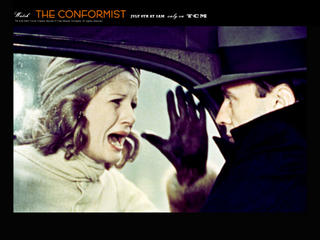Bernardo Bertolucci's The Conformist

To me, Bertolucci's Last Tango in Paris symbolizes the worst excesses of European art cinema of the sixties and the seventies. Actually the film itself acknowledges it, with an element of self-parody specially in the way the new wave filmmaker character was written and portrayed in it. It is the kind of cinema where style is used, not to uncover secret meanings of things, but as a facade to hide the void that lies beneath the surface. The filmmaker thinks what a great filmmaker he is, the cinematographer thinks what a great cinematographer he is and the actor is not far behind. He thinks he is the greatest actor of them all. And perhaps all this is true for Last Tango in Paris. But film is a collaborative medium and if the final product of the collective endeavors has to make some sense, everybody involved in the film has to find the right balance, the right tone. In Last Tango in Paris this balance was not there. That's why it became a big mess (comparatively speaking, it still is a great film by the way). In the film The Conformist (Il Conformista), which he made just before Last Tango in Paris, Bertolucci found the right balance. Perhaps that's what makes it such an effective political drama. And not just that, it works as a pretty effective musical love story and a moral, cautionary tale in the old style. And I have just come out of the screening completely mesmerised by it.
The film is about the life and times a young philosophy professor Marcello from Rome, who wants to live a "normal" life. And to do this he joins the fascist party as soon as Mussolini comes to power. He also marries a silly, petty-bourgeois girl, with petty ambitions ("bed and kitchen, that's all") because that's the "most normal thing to do". But there are darker things behind this pursuit of normalcy. Marcello wants to escape from his messy past (homosexual seduction and murder) and his own emotioal and sexual identity. He is also disappointed with the decadence of his parents' generation which has left his father in a mental asylum and his mother a morphine addict. As a result he finds himself isolated from his fellow human beings and just so that he can "belong", he dedicates himself to the obsessive quest for the average and the mediocre which he calls "being normal". And since this is just the goal fascism had, he naturally finds that the right place to be is in the fascist party with its firm emphasis on deindividualization of the masses and denial of emotional realities.
Marcello soon gets an assignment to kill his former philosophy professor (there's short discussion of Plato's Allegory of the Cave, brilliantly staged by the director and the cameraman), who has now turned a radical Marxist, living an exiled life in Paris. In Paris things get more and more messed up as Marcello falls in love with the bisexual wife of the professor. There are convoluted flashbacks into Marcello's past and the film ends with a devastatingly ironic climax which gives ample chance for Jean-Paul Trintignant (who plays Marcello) to display his acting abilities. Trintignant is same guy who shined in the role of the old judge in Kieslowski's Red. Here too he is utterly brilliant and much of credit for the success of the film should go to him given how believable he makes the complex motivations of the character to the audience.
What I liked best, apart from the usual stuff about the fabulous cinematography, highly stylized and innovative production design and a hauntingly evocative soundtrack, was how Bertolucci analyses the nature and origins of fascism. He thinks that it is not the political and economic reality that fashion a fascist man (although they do contribute) but it is the psychosexual dysfunction that somehow gets transformed into a fascist rhetoric. And also that fascism is not something macho or aggressive but on the other hand it is cowardice and passiveness. It is fear of following one's true instincts and acknowledging the emotional realities of one's self that lead men to the dark pits of fascism.
Okay, even if all this intellectual talk bores you, I can assure the film won't. It's so lush and so visually arresting that most of the contemporary films positively look like home made videos after this. In short an essential watching for all aficionados of European art films, and those who are not will be persuaded after this. And to end with the same note this is the film which symbolizes all that was best in the European art films of sixties and seventies. Don't miss it if you get a chance.
No comments:
Post a Comment